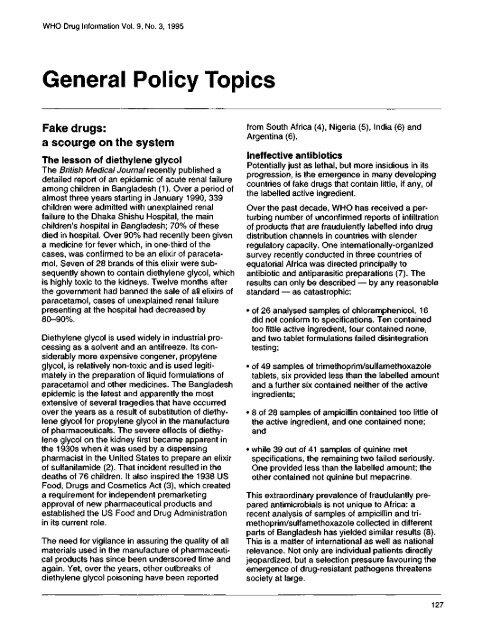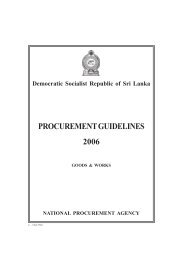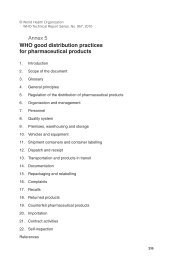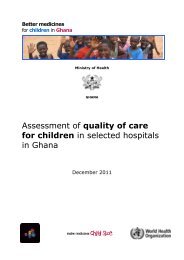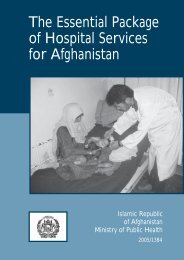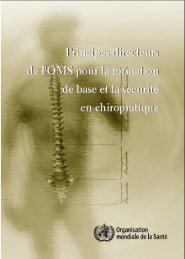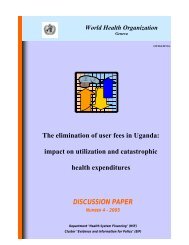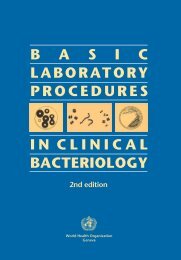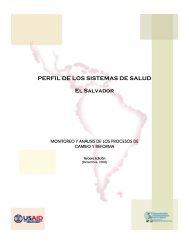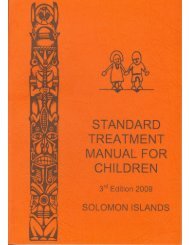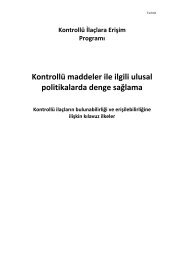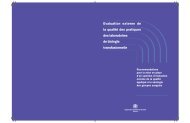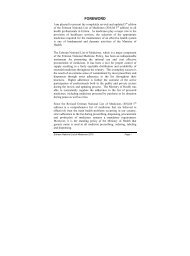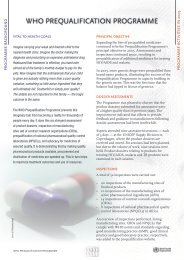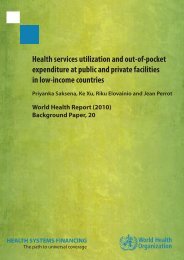WHO DRUG INFORMATION - World Health Organization
WHO DRUG INFORMATION - World Health Organization
WHO DRUG INFORMATION - World Health Organization
Create successful ePaper yourself
Turn your PDF publications into a flip-book with our unique Google optimized e-Paper software.
General PolicyTopicsFake drugs:a scourge on the systemThe lesson of diethylene glycolThe British Medical Journal recently published adetailed report of an epidemic of acute renal failureamong children in Bangladesh (1). Over a period ofalmost three years starting in January 1990, 339children were admitted with unexplained renalfailure to the Dhaka Shishu Hospital, the mainchildren's hospital in Bangladesh; 70% of thesedied in hospital. Over 90% had recently been givena medicine for fever which, in one-third of thecases, was confirmed to be an elixir of paracetamol.Seven of 28 brands of this elixir were subsequentlyshown to contain diethylene glycol, whichis highly toxic to the kidneys. Twelve months afterthe government had banned the sale of all elixirs ofparacetamol, cases of unexplained renal failurepresenting at the hospital had decreased by80-90%.Diethylene glycol is used widely in industrial processingas a solvent and an antifreeze. Its considerablymore expensive congener, propyleneglycol, is relatively non-toxic and is used legitimatelyin the preparation of liquid formulations ofparacetamol and other medicines. The Bangladeshepidemic is the latest and apparently the mostextensive of several tragedies that have occurredover the years as a result of substitution of diethyleneglycol for propylene glycol in the manufactureof pharmaceuticals. The severe effects of diethyleneglycol on the kidney first became apparent inthe 1930s when it was used by a dispensingpharmacist in the United States to prepare an elixirof sulfanilamide (2). That incident resulted in thedeaths of 76 children. It also inspired the 1938 USFood, Drugs and Cosmetics Act (3), which createda requirement for independent premarketingapproval of new pharmaceutical products andestablished the US Food and Drug Administrationin its current role.The need for vigilance in assuring the quality of allmaterials used in the manufacture of pharmaceuticalproducts has since been underscored time andagain. Yet, over the years, other outbreaks ofdiethylene glycol poisoning have been reportedfrom South Africa (4), Nigeria (5), India (6) andArgentina (6).Ineffective antibioticsPotentially just as lethal, but more insidious in itsprogression, is the emergence in many developingcountries of fake drugs that contain little, if any, ofthe labelled active ingredient.Over the past decade, <strong>WHO</strong> has received a perturbingnumber of unconfirmed reports of infiltrationof products that are fraudulently labelled into drugdistribution channels in countries with slenderregulatory capacity. One internationally-organizedsurvey recently conducted in three countries ofequatorial Africa was directed principally toantibiotic and antiparasitic preparations (7). Theresults can only be described — by any reasonablestandard — as catastrophic:• of 26 analysed samples of chloramphenicol, 16did not conform to specifications. Ten containedtoo little active ingredient, four contained none,and two tablet formulations failed disintegrationtesting;• of 49 samples of trimethoprim/sulfamethoxazoletablets, six provided less than the labelled amountand a further six contained neither of the activeingredients;• 8 of 28 samples of ampicillin contained too little ofthe active ingredient, and one contained none;and• while 39 out of 41 samples of quinine metspecifications, the remaining two failed seriously.One provided less than the labelled amount; theother contained not quinine but mepacrine.This extraordinary prevalence of fraudulantly preparedantimicrobials is not unique to Africa: arecent analysis of samples of ampicillin and trimethoprim/sulfamethoxazolecollected in differentparts of Bangladesh has yielded similar results (8).This is a matter of international as well as nationalrelevance. Not only are individual patients directlyjeopardized, but a selection pressure favouring theemergence of drug-resistant pathogens threatenssociety at large.


